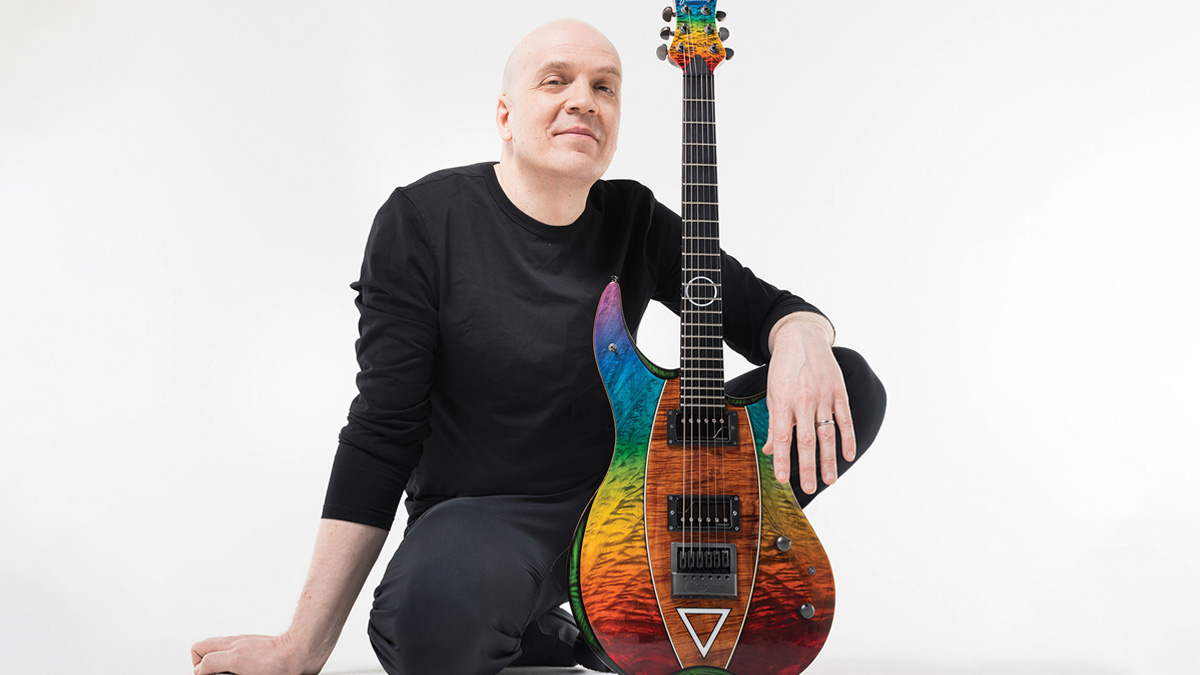Devin Townsend: “I don’t love playing guitar solos, but I think I’m good at them”
The Canadian supernova of creativity checks in to discuss the twists and turns in his predictably unpredictable 21st solo album, Lightwork – and a Nile Rodgers collaboration that may yet see the light of day

Devin Townsend thrives on extremes. From his early ’90s breakthrough singing on Steve Vai’s Sex & Religion, to the brutalizing industrial death-thrash of Strapping Young Lad, to his coffee-centered prog opera Ziltoid the Omniscient, to the drone-heavy ambient daydream of last year’s Snuggles solo album, the Canadian eccentric isn’t known for staying in a specific lane for long.
Townsend is just as predictably unpredictable on his 21st solo album, Lightwork, which may raise eyebrows from the metal faction of his fanbase over its grandiose, hard-swung power ballads (Lightworker), industrial biker rock (Dimensions) and cactus-scented, electro-acoustic strummers (Vacation).
“Sometimes people who aren’t familiar with my work assume I do these things to be provocative,” Townsend suggests of his many musical mood swings, “Like, ‘You know what would really throw a wrench in the works is if we do a dusty acoustic song.’ But it’s not that in the slightest.” The reason for the eclecticism is much simpler: Townsend just wants to try new things.
“It’s like eating steak all day. You wake up and have steak, and then have steak for lunch, dinner and before you go to bed. Man, don’t you get sick of meat after a while? Every now and then you have a big meaty meal, but other times you want some sherbet, or you have a cookie or eat a salad. Writing, for me, is the same – that’s just what I consider to be healthy, artistically.”
Townsend planned for Lightwork to be a straightforward, chill and ultimately optimistic-sounding affair. Structurally and harmonically, it often is. Behind the scenes, however, the record proved to be a challenge.
While he began working on the record in early 2020, pandemic anxieties forced Townsend to pause the project and work through the chaos with his more free-form and moody The Puzzle. Later on, Lightwork sessions with producer Garth Richardson (Rise Against, Rage Against the Machine) were interrupted when a tree fell on the latter’s studio on the scenic Sunshine Coast of British Columbia, knocking out the electricity in the process.
My goal for a solo, rather than thinking ‘OK, what scale are we in?’ is to have the music crescendo with effort
And even when Townsend thought he’d put the album to bed, he made a drastic, last-minute tracklist change this summer after finding out a song had to be scrapped over clearance issues.
Get The Pick Newsletter
All the latest guitar news, interviews, lessons, reviews, deals and more, direct to your inbox!
“We had recorded this song called Honeybunch, which has this [melody] taken from Barbie Girl by Aqua,” he says, adding that his recontextualized take on the ’90s Europop hit also featured some funky guest fretwork from Nile Rodgers. “I thought the loophole was that if you re-record the sample, you could use it because it’s not their version. But it turns out that’s not the case!”
Honeybunch may one day see the light of day, pending approval from Aqua. Its replacement on Lightwork is the decidedly chunkier Heartbreaker, a detuned outlier full of palm-muted riffery and prog-styled time shifts that had been intended to appear on Lightwork’s more experimental bonus disc, Nightwork.
“It’s not the original vibe; however, on some level I think it makes it better for me,” he says of the sequencing shakeup, further noting, “I’m strangely thankful that at the last minute I got to complicate it a little bit.”
Whatever the direction, Townsend graced much of the record with his signature rainbow-coated Framus Stormbender, though he played a Sadowsky T-style for the out-of-phase constellation of bends he brings to Lightwork’s Heavy Burden. The record’s most empirically shredding solo, on Dimensions, comes courtesy of longtime collaborator Mike Keneally, whom Townsend gladly brought in to handle the lead.
“I don’t love playing guitar solos, but I think I’m good at them,” he says. “On the older records – [2011’s] Deconstruction, [2016’s] Transcendence or Ziltoid the Omniscient – there’s more ostentatious guitar parts on my side of things, but rarely do I think to myself, ‘Oh, this needs a solo.’ When I do, I usually do it [in the] first take.”
“My goal for a solo, rather than thinking ‘OK, what scale are we in?’ is to have the music crescendo with effort. So the solo, if I’m fortunate, is representative of that intent,” Townsend continues, concluding with pragmatic Zen, “And then [I] cut it and print it.”
- Lightwork is out now via Inside Out.
Gregory Adams is a Vancouver-based arts reporter. From metal legends to emerging pop icons to the best of the basement circuit, he’s interviewed musicians across countless genres for nearly two decades, most recently with Guitar World, Bass Player, Revolver, and more – as well as through his independent newsletter, Gut Feeling. This all still blows his mind. He’s a guitar player, generally bouncing hardcore riffs off his ’52 Tele reissue and a dinged-up SG.
“His songs are timeless, you can’t tell if they were written in the 1400s or now”: Michael Hurley, guitarist and singer/songwriter known as the ‘Godfather of freak folk,’ dies at 83
“The future is pretty bright”: Norman's Rare Guitars has unearthed another future blues great – and the 15-year-old guitar star has already jammed with Michael Lemmo













